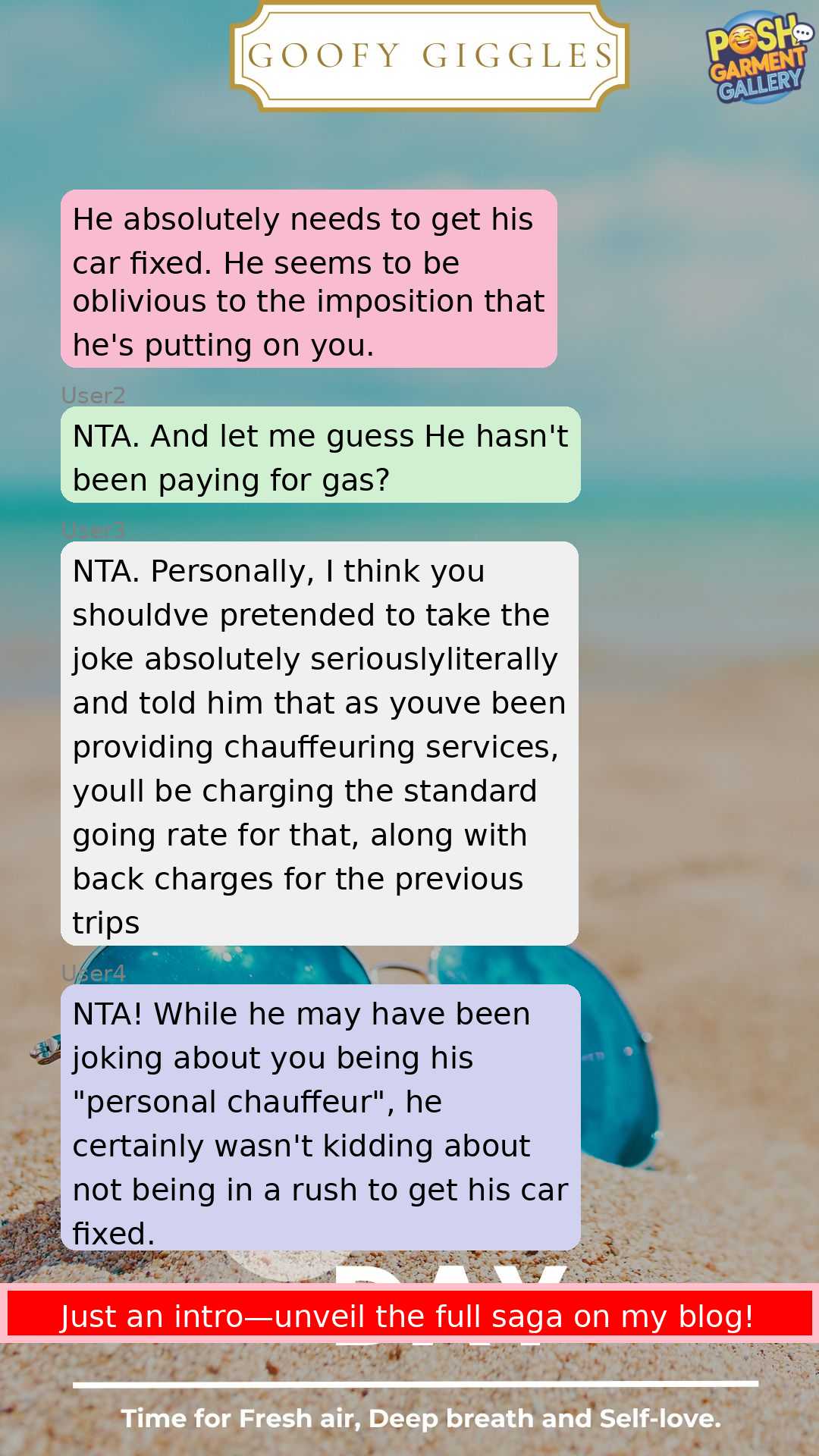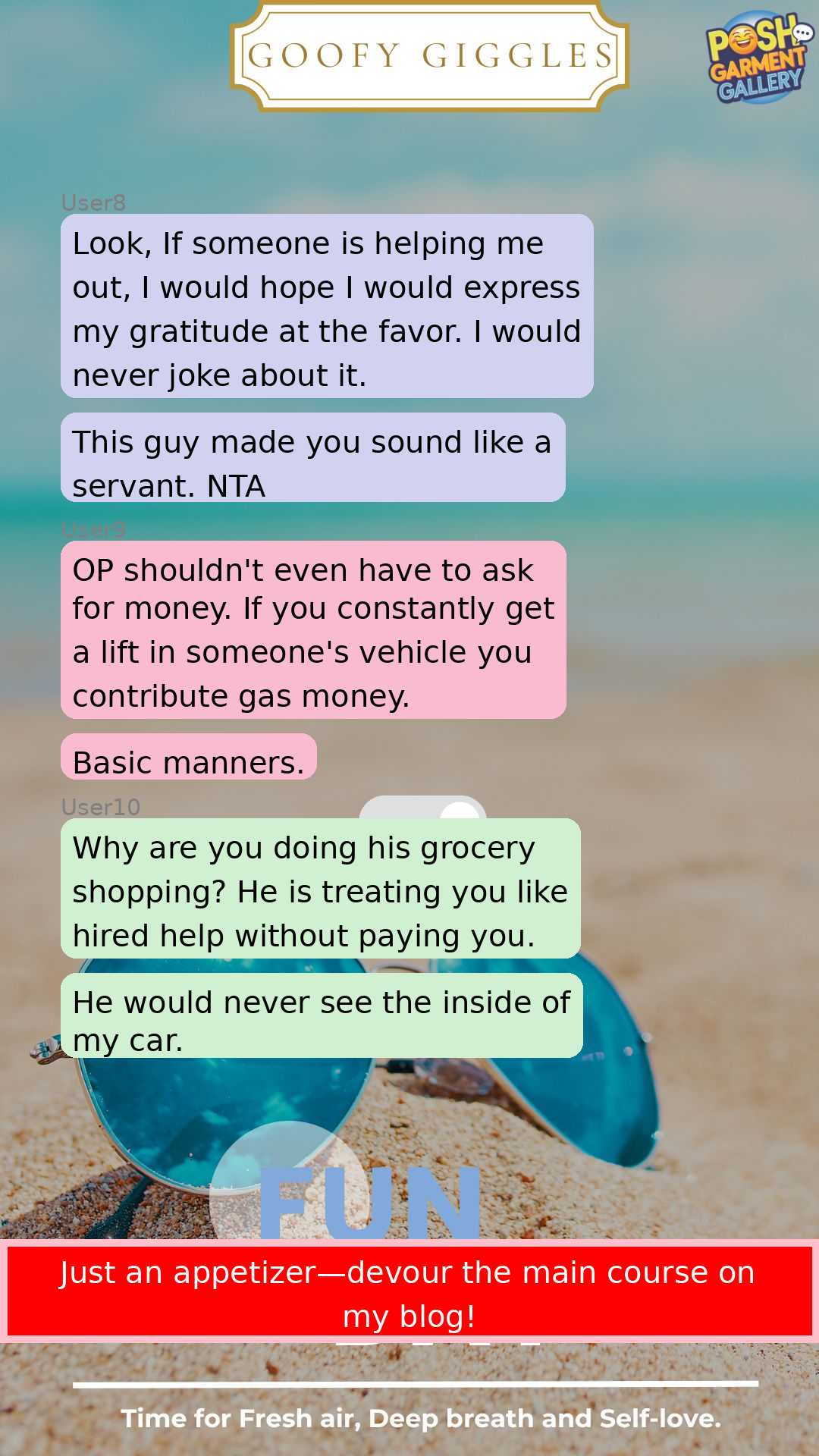AITA: for refusing to give my coworker a ride after he called me his “personal chauffeur”?
 Image credit: Pixabay (This is example image – Not the actual photo)
Image credit: Pixabay (This is example image – Not the actual photo)
When Kindness Turns into a Burden
After offering a coworker rides to work while his car is in the shop, the narrator overhears him jokingly refer to them as his “personal chauffeur.” Feeling unappreciated and taken for granted, they decide to decline his request for another ride, leading to an unexpected confrontation. This relatable scenario raises questions about boundaries in friendships and the fine line between helping others and being exploited. How far should kindness go before it becomes a source of resentment?
Family Drama and Conflict Resolution: A Ride to Work
In a recent situation involving a coworker, a conflict arose that highlighted the complexities of workplace relationships and boundaries. Here’s a breakdown of the events:
- Background: The narrator has a coworker who lives nearby and has previously received rides to work.
- Current Situation: The coworker’s car is in the shop for repairs, prompting him to request another ride.
- Additional Request: Along with the ride, the coworker asked if the narrator could stop by the store to pick up groceries, which the narrator agreed to do.
- Joking Remarks: During a conversation, the coworker made light-hearted comments referring to the narrator as his “personal chauffeur” and suggested he didn’t need to rush getting his car fixed.
- Response to Jokes: Upon hearing these remarks, the narrator felt uncomfortable and decided to decline the coworker’s request for a ride after work.
- Conflict Escalation: When the coworker asked for a ride again, the narrator expressed their feelings about the jokes, stating they found them inappropriate.
- Coworker’s Reaction: The coworker dismissed the narrator’s feelings, claiming they were overreacting and that he was merely joking.
- Outcome: The narrator did not provide the ride, leading the coworker to resort to paying for an Uber instead.
This situation raises questions about boundaries and the interpretation of humor in relationships. The narrator is left wondering if their decision to refuse the ride was justified or if they overreacted to the coworker’s comments.
In navigating family drama and workplace dynamics, it’s essential to communicate openly and establish clear boundaries. Conflict resolution may involve discussing feelings directly and finding a mutual understanding to prevent future misunderstandings.
Ultimately, the narrator’s feelings are valid, and it’s important to recognize when humor crosses a line into discomfort. Balancing kindness with self-respect is crucial in maintaining healthy relationships, whether in a personal or professional context.
This is Original story from Reddit
 Image credit: Pixabay (This is example image – Not the actual photo)
Image credit: Pixabay (This is example image – Not the actual photo)
Story
I have a coworker who lives near me, and I’ve given him a ride to work a few times before. Well, his car is now in the shop needing work done, and he asked for a ride again. Not a big deal; he even asked if I could stop by the store for him to pick up groceries, and again I didn’t mind as I had nothing else going on.
Well, earlier I heard him joking about how I’m his “personal chauffeur” and that “he didn’t need to rush his car getting fixed.” He asked me for a ride again today after work, and I told him no, bringing up what I heard him say. He said I’m overreacting and that he was just kidding.
I didn’t give him a ride home, and he had to pay for an Uber. Am I an asshole for not giving him a ride home? Or was his “joking” as rude as I took it?
View the Original Reddit Post Here
Summary of Reddit Comments
The top Reddit comments reveal a strong consensus around NTA due to the user’s friend making inappropriate jokes about being a “personal chauffeur” and taking advantage of their kindness. Most users agree that the friend should be more considerate and contribute to transportation costs, highlighting the importance of gratitude and respect in friendships.
Overall Verdict
NTA
Expert Advice for Resolving the Conflict
Conflict in workplace relationships can be challenging, especially when humor is involved. Here are some practical steps for both the narrator and the coworker to address the situation and move forward positively:
For the Narrator
- Reflect on Your Feelings: Take some time to understand why the coworker’s jokes made you uncomfortable. Acknowledge your feelings as valid and important.
- Communicate Clearly: Consider having a calm and honest conversation with your coworker. Express how the jokes affected you and why you felt the need to set boundaries.
- Set Boundaries: Clearly outline what you are comfortable with regarding rides and any additional requests. It’s okay to say no if it feels like too much.
- Suggest Alternatives: If you’re open to it, suggest other ways your coworker can get to work or run errands, such as carpooling with someone else or using public transportation.
- Maintain Professionalism: Regardless of the outcome, keep interactions professional. Avoid gossiping about the situation with other coworkers to maintain a positive work environment.
For the Coworker
- Listen Actively: When the narrator expresses their feelings, listen without dismissing their concerns. Acknowledge their perspective and validate their emotions.
- Reflect on Your Humor: Consider how your jokes may have been perceived. Humor can sometimes cross boundaries, and it’s important to be mindful of how it affects others.
- Apologize if Necessary: If you recognize that your comments were inappropriate, a sincere apology can go a long way in mending the relationship.
- Be Grateful: If the narrator agrees to help you again in the future, express gratitude for their kindness. A simple thank you can reinforce positive feelings in your relationship.
- Explore Other Options: Instead of relying solely on the narrator for rides, consider other transportation options. This shows independence and respect for their boundaries.
Moving Forward
Both parties should aim to foster a respectful and understanding relationship. Open communication is key to resolving misunderstandings and preventing future conflicts. By addressing feelings and setting clear boundaries, both the narrator and the coworker can work towards a healthier dynamic.
Join the Discussion
 Image credit: Pixabay (This is example image – Not the actual photo)
Image credit: Pixabay (This is example image – Not the actual photo)
What do you think? Would you have handled this differently?
Share your thoughts below! Vote: Do you agree with Reddit’s verdict?






